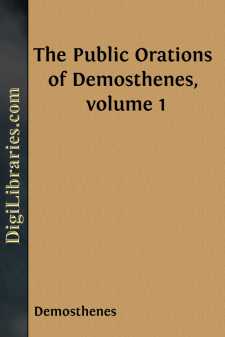Categories
- Antiques & Collectibles 13
- Architecture 36
- Art 48
- Bibles 22
- Biography & Autobiography 813
- Body, Mind & Spirit 142
- Business & Economics 28
- Children's Books 15
- Children's Fiction 12
- Computers 4
- Cooking 94
- Crafts & Hobbies 4
- Drama 346
- Education 46
- Family & Relationships 57
- Fiction 11829
- Games 19
- Gardening 17
- Health & Fitness 34
- History 1377
- House & Home 1
- Humor 147
- Juvenile Fiction 1873
- Juvenile Nonfiction 202
- Language Arts & Disciplines 88
- Law 16
- Literary Collections 686
- Literary Criticism 179
- Mathematics 13
- Medical 41
- Music 40
- Nature 179
- Non-Classifiable 1768
- Performing Arts 7
- Periodicals 1453
- Philosophy 64
- Photography 2
- Poetry 896
- Political Science 203
- Psychology 42
- Reference 154
- Religion 513
- Science 126
- Self-Help 84
- Social Science 81
- Sports & Recreation 34
- Study Aids 3
- Technology & Engineering 59
- Transportation 23
- Travel 463
- True Crime 29
The Public Orations of Demosthenes, volume 2
by: Demosthenes
Description:
Excerpt
[Introduction. Late in the year 343 (some time after the acquittal of Aeschines) Philip invaded Epirus, made Alexander, brother of his wife Olympias, king of the Molossi instead of Arybbas, and so secured, his own influence in that region. Arybbas was honourably received at Athens. Philip next threatened Ambracia and Leucas, which were colonies of Corinth, and promised to restore Naupactus, which was in the hands of the Achaeans, to the Aetolians. But Athens sent Demosthenes, Hegesippus, Polyeuctus and others to rouse the Corinthians to resistance, and also dispatched a force of citizens to Acarnania to help in the defence against Philip. Philip thereupon returned, captured Echinus and Nicaea on the Malian Gulf, and established a tetrarch in each division of Thessaly (343 B.C., or early in 342). In 342 Philistides was established, by Philip's influence, as tyrant at Oreus in Euboea (as Cleitarchus had been at Eretria in the preceding year), and the democratic leader Euphraeus committed suicide in prison.[1] The town of Chalcis, however, under Callias and Taurosthenes, remained friendly to Athens, and made a treaty of alliance with her.
About the same time a controversy, begun in the previous year, in regard to Halonnesus, was renewed. This island had belonged to Athens, but had been occupied by pirates. At some time not recorded (but probably since the Peace of 346) Philip had expelled the pirates and taken possession of the island. He now sent a letter, offering to give Halonnesus to Athens, but not to give it back (since this would concede their right to it); or else to submit the dispute to arbitration. He also offered to discuss a treaty for the settlement of private disputes between Athenians and Macedonians, and to concert measures with Athens for clearing the Aegean of pirates. He was willing to extend the advantages of the Peace to other Greek States, but not to agree that he and Athens should respectively possess 'what was their own', instead of 'what they held'; though he was ready to submit to arbitration in regard to Cardia and other disputed places. He again denied having made the promises attributed to him, and asked for the punishment of those who slandered him. Hegesippus replied in an extant speech ('On Halonnesus'), while Demosthenes insisted that no impartial arbitrator could possibly be found. Philip's terms in regard to Halonnesus were refused, but the Athenian claim to the island was not withdrawn.
Philip spent the greater part of 342 and 341 in Thrace, mainly in the valley of the Hebrus, where he endured very great hardships through the winter, and founded colonies of Macedonian soldiers, the chief of these being Philippopolis and Cabyle. He also entered into relations with the Getae, beyond the Haemus, and garrisoned Apollonia on the Euxine. These operations were all preparatory to his projected attack upon Byzantium. (Byzantium and Athens were at this time on unfriendly terms, owing to the part taken by the latter in the Social War.)
But the immediate subject of the present Speech was the state of affairs in the Chersonese in 342. The Chersonese (with the exception of Cardia) had been secured for Athens in 357, but had been threatened by Philip in 352,[2] when he made alliance with Cardia, and forced the neighbouring Thracian Prince Cersobleptes to submit. Soon after the Peace of Philocrates, Athens sent settlers to the Chersonese under Diopeithes. Cardia alone refused to receive them, and Diopeithes, with a mercenary force, prepared to compel the Cardians to admit them; while Philip sent troops to hold the town, and complained to Athens in threatening terms of the actions of Diopeithes, and more particularly of an inroad which Diopeithes had made upon Philip's territory in Thrace. Diopeithes had been ill-supported with money and men by Athens, and had had recourse to piratical actions, in order to obtain supplies, thus arousing some indignation at Athens; but the prospect of the heavy expenditure which would be necessary, if an expedition were sent to his aid, was also unattractive. Demosthenes, however, proposed that Diopeithes should be vigorously supported, on the ground that Philip was really at war with Athens, and that this was not the time to interfere with the general who alone was pushing the Athenian cause....




